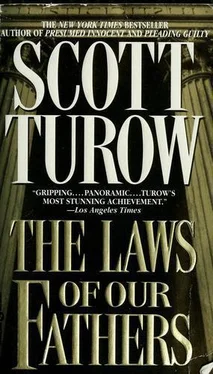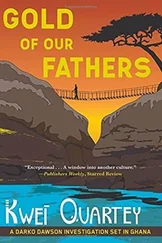Scott Turow - The Laws of our Fathers
Здесь есть возможность читать онлайн «Scott Turow - The Laws of our Fathers» весь текст электронной книги совершенно бесплатно (целиком полную версию без сокращений). В некоторых случаях можно слушать аудио, скачать через торрент в формате fb2 и присутствует краткое содержание. Жанр: Криминальный детектив, на английском языке. Описание произведения, (предисловие) а так же отзывы посетителей доступны на портале библиотеки ЛибКат.
- Название:The Laws of our Fathers
- Автор:
- Жанр:
- Год:неизвестен
- ISBN:нет данных
- Рейтинг книги:5 / 5. Голосов: 1
-
Избранное:Добавить в избранное
- Отзывы:
-
Ваша оценка:
- 100
- 1
- 2
- 3
- 4
- 5
The Laws of our Fathers: краткое содержание, описание и аннотация
Предлагаем к чтению аннотацию, описание, краткое содержание или предисловие (зависит от того, что написал сам автор книги «The Laws of our Fathers»). Если вы не нашли необходимую информацию о книге — напишите в комментариях, мы постараемся отыскать её.
The Laws of our Fathers — читать онлайн бесплатно полную книгу (весь текст) целиком
Ниже представлен текст книги, разбитый по страницам. Система сохранения места последней прочитанной страницы, позволяет с удобством читать онлайн бесплатно книгу «The Laws of our Fathers», без необходимости каждый раз заново искать на чём Вы остановились. Поставьте закладку, и сможете в любой момент перейти на страницу, на которой закончили чтение.
Интервал:
Закладка:
Long batons were holstered at their sides, and a large plastic shield rested at the feet of each officer, like an obedient dog.
The turnout was far larger than any of us on the Mobilization Committee had foreseen. The weather, a welcome relief from a recent chilly spell, made it a good day to cut classes. I rarely admitted to myself the extent to which demonstrating had become sport for people my age. A generation that had lived secondhand through the television set seemed to find a special thrill in the live spectacle. But the political climate was also provocative. In the aftermath of the Moratorium Day in October, in which campuses and many businesses around the country had shut down, Richard Nixon had delivered a defiant speech announcing that a 'silent majority' of Americans supported his refusal to withdraw from Vietnam. The ugliness of the war Nixon wanted to maintain had been underscored by reports this week of a young lieutenant, William Laws Calley, detained at Fort Benning on suspicion of having slaughtered five hundred Vietnamese villagers.
As music played, the crowd assembled on the ARC's vast lawn. Sonny and I lay toward the rear on a large beach towel. Behind us, people threw Frisbees for their dogs, while the usual contingent from the National Organization for Marijuana Legalization lofted smoke upwind where the telltale aroma breathed down on the security forces, who were powerless to abandon their posts.
Near 3:30, the speeches began. The Moratorium demonstrations were intended to show the breadth of opposition to the war, and representatives of all the participating organizations briefly spoke: church groups, faculty committees, union representatives, businessmen against the war, women's liberationists, browns and blacks, students of all stripes, from rads to McCloskey Republicans. In this pantheon, One Hundred Flowers had been included, notwithstanding objections that their agenda was not peace. As a makeshift stage, the speakers had mounted a sign for the ARC, a large concrete block perhaps six feet high, and near the end of the afternoon Loyell Eddgar appeared there. The various entities that comprised One Hundred Flowers had identified themselves with red arm sashes decorated with Chinese characters. As Eddgar was announced, a number of them forced themselves through the crowd toward the front. About sixty members of the Progressive Labor Party went by close to where Sonny and I were sitting. They were all in their khakis, and rushed forward, heads bowed, hands on the shoulders of the person ahead, the tails of their arm sashes turned at the same precise angle. They chanted: Mao is red Red's Supreme Mao will smash the war machine.
I had never heard Eddgar speak before and my impression at first was that I was experiencing some trick of perspective, seeing from a distance someone I'd known only at close range. Here was this lean figure dressed simply in a button-down shirt and chinos that might have been left over from his college years. His thick, dark hair was lustrous with sweat, and the tendons and muscles in his neck and jaw stood out as he spoke. But gradually I realized he was in fact someone else. Standing on the concrete block, projecting his voice through a bullhorn which amplified both his breathing and the click of the machine going on and off, Eddgar was transformed by revolutionary passion. In the spirit of the Cultural Revolution, he called for the destruction of all elites.
'We must make this university a place that improves the world rather than destroys it. We do not need to study how to cook our enemies. We must study how to feed the poor, and help them feed themselves. We must stop educating the children of the ruling class, to the exclusion of the black, the brown, the red and yellow people who come into our classrooms more often to clean the desks than to sit behind them as students.'
Led by One Hundred Flowers members who were still pushing to the front, the crowd began greeting Eddgar's well-timed pauses with choruses of 'Right on!'
'We must take the power to make the decisions about our lives from people who care only about theirs," Eddgar cried. 'We must, as Mao taught, "Make trouble, fail; make trouble again, fail again… till their doom." '
Suddenly, somewhere near the front, a woman cried out – a shocking, terrified sound. Something was happening. We all knew it. 'This isn't good,' Sonny said and pulled me to my feet. Around us, everyone was rising.
Eddgar, who had been silent for a moment, screamed another quotation into the bullhorn: ' "It is good we are attacked by the enemy, since it proves we have drawn a clear line of demarcation between the enemy and ourselves." '
I saw the first rock in the air then, traveling a long arc toward the enormous panes of the front windows of the building. The closed environment, the riot-clothed coppers, the university's sullen, entrenched battlefield atmosphere agitated me enough that an abandoned, heart-sprung piece of me probably soared in flight with that stone. But the thinking part was already in agony. The window seemed to drop out at once. A waterfall of glass crashed down on the cops, who reacted immediately. They claimed afterwards there'd been some further attack, but I know I saw batons swinging then. There was intense confusion, high-pitched screaming, fierce buffeting as people fled.
From the rear, where Sonny and I were, the deterioration near the stage had a remote quality for a moment. We could see the crowd peeling back in rows twenty or thirty deep as the line of cops fell upon them. Then suddenly, the ripples of panicked movement were nearby, then around us – molten faces and piercing voices and hair flying about. The earth jumped with the pounding of the mob. Some people held their ground momentarily to throw rocks and cans, but Sonny and I ran. As I reached the road back to the gates, a young woman stumbled to the asphalt right next to me and I helped her up. There was an open gash across her forehead, amid a throbbing welt. Blood ran on her face and was already crusted in her hair. She wiped at it tentatively and cried aloud when she saw her hand, then she ran along, clearly afraid of being struck again. You could feel from the surging, wild movement of the crowd that the cops were still coming, still swinging.
For a moment, as we all rushed toward the gates, the panic seemed to have receded. I had lost Sonny somewhere and I stood on the tarred drive, yelling her name, answered with the cries of a dozen people like me attempting to find someone from whom they'd been separated. Then, without warning, another hysterical chorus rose up. With the second volley, I recognized the screaming sound of the canisters in the air. The little smoky trails, innocuous-appearing at a distance, dissolved as they rose from the ground, but the students knew enough to take flight with a new, maddened intensity. At the bottom of the hill, I could see people climbing the iron fence, and the spikes rocking at other points as the crowd massed against it. Overhead, the birds who had tasted the tear gas shrieked, flying crazy circles, mad with pain.
Near the gate, it was a horrible scene. I saw a woman with her head trapped against a concrete post, entirely unable to move for an instant until she suddenly disappeared. Beyond the gates, people rushed on, screaming and crying, shouting threats against the police. Once I was on the gravel road, I turned back again, searching the grieved, dirt-streaked faces for Sonny. As they flowed past, I noticed a few who somehow had the foresight to soak washcloths, which were now stuffed into their mouths to abate the effects of the gas. There were even three or four people, each dressed in the PLP khakis, who wore rubber gas masks. As she came by, one woman pried off the green-monster face of her mask and, improbably, kissed me. It was Lucy.
'We're with Cleveland. We were. I don't know where he and Hobie are.' She looked in all directions.
Читать дальшеИнтервал:
Закладка:
Похожие книги на «The Laws of our Fathers»
Представляем Вашему вниманию похожие книги на «The Laws of our Fathers» списком для выбора. Мы отобрали схожую по названию и смыслу литературу в надежде предоставить читателям больше вариантов отыскать новые, интересные, ещё непрочитанные произведения.
Обсуждение, отзывы о книге «The Laws of our Fathers» и просто собственные мнения читателей. Оставьте ваши комментарии, напишите, что Вы думаете о произведении, его смысле или главных героях. Укажите что конкретно понравилось, а что нет, и почему Вы так считаете.












